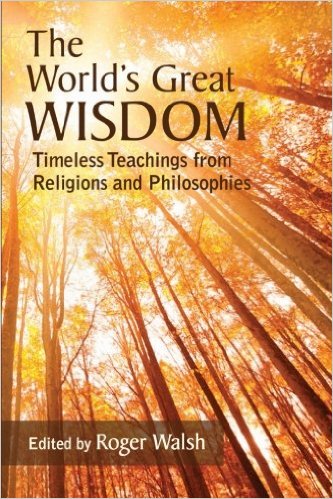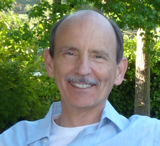
The World’s Great Wisdom: Timeless Teachings from Religions and Philosophies
by Roger Walsh (Editor). Published by State University of New York Press
buy from an Independent bookstore (using store locator)
buy from Amazon.com
Jump to: Table of Contents
Jump to: Reviews
DESCRIPTION
What is wisdom and how is it cultivated? These are among the most important questions we can ask, but questions that have been routinely ignored in modern times. In the twentieth century, the search for wisdom was replaced by a search for knowledge as science and technology promised answers to life’s ills. However, along with scientific achievements came disasters, particularly the devastation of the planet through the accelerating use of modern technology. In an era drenched in data, a desire for wisdom has been reborn. Where can we go to learn about wisdom? The answer is clear: to the world’s great religions and their accompanying philosophies and psychologies. The World’s Great Wisdom makes these treasuries available. Practitioners from each of the great religions—as well as from Western philosophy and contemporary research—provide summaries of their traditions’ understandings of wisdom, the means for cultivating it, and its implications for the modern world. This book offers distillations of the world’s accumulated wisdom—ancient and modern, religious and scientific, philosophical and psychological. It is a unique resource that for the first time in history brings together our collective understanding of wisdom and the ways to develop it.
Reviews of The World’s Great Wisdom
“The editor of this anthology is the prolific Roger Walsh, a psychiatrist and psychologist, who has contributed three chapters to this book. His material is both profound and reader-friendly. I wish he could have written the entire book. The chapters range from brilliant to mediocre, but none of them misrepresent their topic. The chapters on the Abrahamic religions are splendid as are the three chapters on Eastern traditions. But there is no chapter on African, Latin American, or Australian wisdom, and almost no mention of shamanism or psychedelics, despite the crucial roles they have played.in the wisdom traditions. Walsh’ chapter on “The World’s Great Wisdom” (and its four quadrants) is a tour de force and worth the price of the book.”
—Stanley Krippner
“In The World’s Great Wisdom, Timeless Teachings From Religions and Philosophies, Roger Walsh, MD, PhD, DHL has assembled eminent scholars from eight religious/spiritual traditions into what amounts to an Encyclopedia of religious theology and philosophy at the most profound level.
His one volume masterpiece includes views from scholars of Judaism, Christianity, Islam, Hindu, Buddhist, Dao, Confucian and Western Wisdom and Philosophies.
This volume should be a required text in all comparative religion classes as well as a primer for those engaged in working for loving and peaceful relations with those of other religions.
Though profound at the same time it is amazingly simple but for sure, once I completed it, I started at the beginning again and found concepts and history about which I previously had no reliable information. It is filled with a richness that satisfied my core.
Rabbi Rami Shapiro PhD, DDiv writes, “Jewish wisdom, chochmah in Hebrew, isn’t as much a body of knowledge to be mastered, as it is a lifelong project to be undertaken.”
Luke Dysinger, OSB, MD, DPhil writes, “”Christian wisdom” cannot be defined as a single intellectual or spiritual construct, since each Christian culture necessarily cherishes a unique constellation of values and practices that characterizes the sage or practitioner of wisdom within that culture.”
Reza Shah-Kazemi, PhD writes, “In what follows, we hope to reveal the way in which wisdom in the Islamic tradition can be viewed as a seed.”
In contrasting “abstract intellectual ideas,” with wisdom, Georg Feuerstein, PhD, MLitt writes, “The difference is that wisdom has a living quality, intellectual ideas do not. Wisdom grows, transforms, and deepens a person; intellectual ideas at best broaden his or her intellectual horizon.”
Ari Goldfield, JD writes, “Buddha himself urged his followers to make their discovery of wisdom their own personal journey, teaching:
“Just as a merchant buying gold
Would examine the gold by melting, cutting, and rubbing it,
So monks, nuns, and the wise
Should not accept my teachings out of faith,
But only after analyzing my words thoroughly.” (Gyamtso, 1997”Livia Kohn, PhD writes of the Dao, “Its vision of wisdom is highly practical– how to perceive reality in the best possible way and how to apply this perception in the world to the benefit of all.” “The underlying worldview is a mixture of rational, prerational, and transrational modes of cognition.”
Michale C. Kalton, PhD writes about the Confucian pursuit of wisdom, “…a matter above all of guidance in how to live.” “Confucians located the profound in the life-giving conduct of government, social, and family relationships as carried on in everyday life.”
Of Western Philosophy, Robert McDermott, PhD writes, “Wisdom is precisely the knowledge most worth having, often after a lifelong search, and subsequently extremely valuable. In this sense, wisdom is deep or uncommon knowledge essential for living and a foundation for right action.”
Dr. Walsh delivers when early on he writes, “The World’s Great Wisdom… offers a distillation and examination of the world’s priceless heritage of humanity’s deepest insights into the great questions and issue of life.”
I hope this peek into this volume will wet your appetite for securing a copy of this book for yourself.”
—George L. Mclaird
“Here is a timely important book. As Walsh advances, we are inundated with information and drowning in data, yet largely bereft of wisdom. ‘This is a dangerous imbalance, and the fate of our species and our planet may well depend on giving wisdom a more central place in both our personal and public lives.’
The book has contributions by persons who are both noted scholars in their field as well as practitioners in the following traditions: Judaism, Christianity, Islam, Hinduism, Buddhism, Daoism, Confucianism, and Western Philosophy. In all chapters, for every tradition, these major questions are address: What is wisdom? How is it cultivated? What are its implications for individuals, society, and the world? In this way the book brings together priceless treasures: humankind’s understandings of wisdom and the way they can be cultivated and nurtured. The chapters all have, in their specific ways, many worthwhile and enriching contributions to make. It is interesting to see how the representatives of the various traditions find their structure for presentation: e.g. in the Christian sense, four categories of wisdom are described: textual, moral, intellectual and mystical; in the Islam chapter wisdom is related to spiritual inspiration, divine Revelation, human purification, intellectual contemplation and heartfelt invocation. The Buddhist chapter brings an engaging stepwise elaboration on a tentative definition presented by the author.
In this review I focus on the chapters written by Walsh himself, specifically the last two chapters. In the first of the two, Walsh presents an integral overview going with the former chapters, and much more than that. This is as a wonderfully inspiring ‘quest’ for understanding the essence of wisdom, with step by step exploring, addressing, weighing, discarding or embracing, balancing and integrating – I have enjoyed this chapter as an examplar of one way that knowledge may start to evolve into wisdom. Walsh presents some insights of the integral model (Ken Wilber), applying them specifically to his wisdom investigations. This includes states and stages in wisdom, developmental lines, and types of wisdom; effective elements for supporting this quest.
I feel touched by the statement about the ratio of wisdom to foolishness, to be called the sagacity: stupidity ratio… with the serious message: this ‘sagacity: stupidity ratio will likely determine the fate of societies, our species, and our planet.’
The traditional Western two categories that are discerned, subjective and practical wisdom are insufficient. As Walsh advances, we need to distinguish at least three epistemologically, cognitively and phenomenologically distinct modes of subjective wisdom: intuitive apprehension, conceptual understanding, and transconceptual insight. And also: we need to distinguish multiple levels of wisdom(s): these various modes of wisdom mature as persons develop. Another crucial point is the need for methods for both cultivating and assessing higher levels of sagacity. Not much place in Western context is allowed to what may be called postconventional and transpersonal stages in development, that point to our developmental potentials, their expressions – also in wisdom – being so urgently needed. Eastern traditions have many refined practices to offer, that Western traditions – as far as they did include these – have lost for large parts. Indeed, the author on wisdom in Western Philosophy states as his conviction that the ideal of wisdom was prominent at the dawn of Western philosophy but modern and contemporary philosophers have generally denied its significance; as he says, the ideal of wisdom is worthy to be reestablished as the source and goal of philosophy.Walsh statement that psychodynamics needs to have an important place in wisdom research speaks to me; as he says, both because of their power and pervasiveness, and because both ordinary defenses and higher level metadefenses – that continue to manifest in refining ways, also in postconventional and transpersonal stages – can inhibit exceptional functioning, quite likely including wisdom. Higher states and stages of wisdom may be read about, but the full significance of their impact escapes those that are not up to these, that haven’t had direct experience; with the tricky aspect that they will not realize that it is escaping them. Transconceptual and transrational apprehension and wisdom is described in all great wisdom traditions; however it is almost entirely lost to contemporary academics.
What will it take to revive wisdom? In the final chapter Walsh addresses various resources, and ways that wisdom can be ‘taught.’ Some crucial recommendations regard lifestyle, relationships, intellectual activities, investigation, personality transformation and contemplative practices. Lastly, Walsh underscores the need for ‘gnostic intermediaries’, persons he defines as having the capacity to effectively translate and transmit wisdom from one culture or community to another; a translation/transmission that can be across cultures or across times.
For conclusion, a few remarks in the sideline: if one person has the broad, deep and practice-experienced background for editing and writing such an encompassing study, it is Roger Walsh. He is a Professor of Psychiatry, Philosophy, and Anthropology and a Professor in Religious Studies Program, and the author of several books, including The World of Shamanism: New Views of an Ancient Tradition. In that last perspective: there is very little attention in the book for native and tribal wisdom traditions, that are not as ‘organized’ and institutionalized as the ones presented; still they do have their great varied wisdom contributions. Regarding layout: sometimes I found the organizing of three kinds of subtitles, with their sections, within chapters not very clear and rather confusing.
Altogether this book, with its broad embrace, is a must for anyone interested in spirituality, religion, philosophy and wisdom, and it ranges much further: it is a book with implications that regard everyone, all of us, in the sense of sagacity versus foolishness… a book that can have real impact for the future of the planet.
Review by Adeline van Waning MD PhD, author of ‘The less dust the more trust, Participating in The Shamatha Project – meditation and science'”
—Adeline van Waning MD PhD

 Roger Walsh is professor of psychiatry, philosophy, and anthropology, as well as professor in the religious studies program at the University of California at Irvine.
Roger Walsh is professor of psychiatry, philosophy, and anthropology, as well as professor in the religious studies program at the University of California at Irvine.